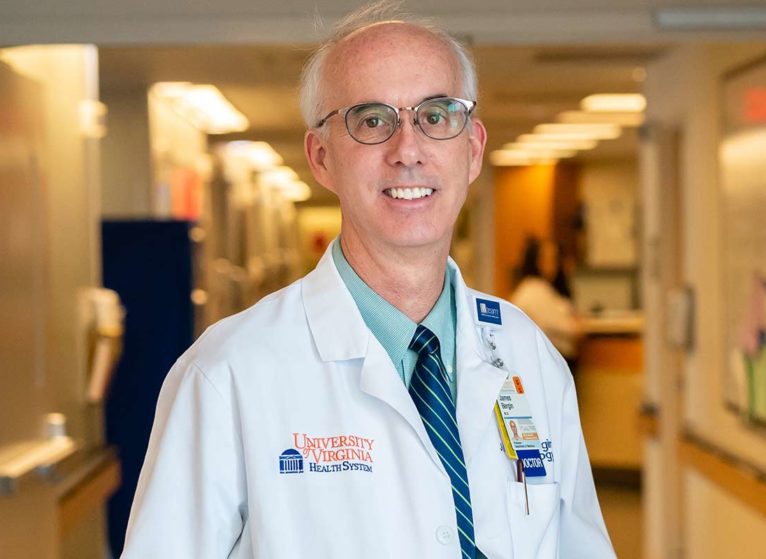Cardiologists specialize in treating and preventing heart diseases. If you're experiencing heart-related symptoms, your primary care provider will refer you to a cardiologist. They'll oversee your care while treating your heart condition.
Some conditions are treatable with medications, whereas others may require surgical procedures such as ablation and devices.
Meet Cardiologist James Bergin, MD
Cardiologist James Bergin, MD, has more than 20 years of experience treating heart patients. He specializes in heart failure and heart transplants. He's also heavily involved in heart failure research, with many findings published in scientific journals.
We asked him to answer our 7 Quick Questions.
1. Why did you become a doctor?
My father was a physician, my mother was a nurse, and my two older sisters were nurses. I enjoyed watching what they were doing to help people. I wanted to try to contribute similarly.
Once I became a physician, I found it incredibly rewarding.
2. Why did you choose heart failure and heart transplant?
When I was a resident, one of my mentors was a heart failure and transplant cardiologist, and another was a transplant pulmonologist. I was fascinated by what they were doing and the available treatment options. That was 30 years ago, and what we have now is remarkably more advanced.
The technology keeps expanding, and I have enjoyed the ongoing learning it requires.
I also enjoy the balance that I get with acute care in the outpatient clinics. I have found it an absolute joy and remarkable privilege to take care of people over 20 to 30 years.
3. What is the one thing about your specialty that might surprise people?
Just like in the movies, the surgeons really do fly back with the heart in a cooler.
4. Where did you grow up?
Most of my time growing up was spent in a suburb of Denver, Colorado, where I learned to enjoy hiking and skiing.
5. What is the most exciting research happening in your field right now?
The newer technologies to help support the heart, including temporary and more permanent ventricular assist devices. These keep getting more sophisticated and smaller.
We also have newer technologies that can remotely monitor intrathoracic pressures in the pleural cavity, the space that lines the interior chest wall .
Stem cell research continues to be an exciting possibility, though seemingly just out of reach.
6. Who is your inspiration or hero?
My mother is probably the one who pushed me the most when I was getting started and remains a cheerleader for me.
One of my early transplant professors in Boston was remarkable and taught me a lot with his approach to patients and families.
My wife is also a constant source of inspiration.
7. What is your favorite thing about working at UVA?
I think the people and the environment are great. I work with a fantastic team of caring and compassionate individuals, including nurse practitioners, physician assistants, nurses, and physicians. And especially the outpatient nurse coordinator and the administrative assistant, they run the place (shout out to Bekah McGehee and Jenene Reaves).
The majority of heart failure patients experience fatigue and shortness of breath. They may also develop other signs or symptoms such as bloating in the abdomen or swelling in the feet. They may also have troubles such as filling up quickly when they start to eat. That's called early satiety. All of those would speak to congestion of the abdominal organs. What we commonly see are patients who think they're fine. They're just coughing, they're a little bit more short of breath. They think that they have a pneumonia or something. They see a physician. They put them on antibiotics, and it just doesn't clear. And then eventually, someone ends up doing some sort of heart study like an Echo or something, and that's when they determine that all along, the whole cause of this has been not the lungs, but it's the heart. So the first things we like to cover in treatment options would be to instruct the patients as far as salt and fluid intake. Because that can have a big impact. The next treatment option usually is trying to control the amount of fluid in the system and such using a diuretic. So a fluid pill to get rid of extra fluid. And then putting them on therapies to make it easier for the heart to eject the blood. So these are all the standard medical regimens that we use. The next step up is, if someone's having continued symptoms despite all of those therapies, then we start talking about heart pumps. So assist pumps. And these are usually durable pumps that people-- you would put in with surgery, and they would be up walking around and living long term with. I think people should come to UVA because we have the unique ability to really provide all aspects of care. Once you step in, we're able to cover it all. You don't have to go next door to some other clinic. You don't have to go down the street to a different hospital or see other physicians. We can really offer everything right here. So it's the cardiologist, the cardiovascular surgeons. It's the lung doctors who are involved with the care compliment us in clinic. We have the GI doctors, the blood doctors. Everyone is right here at all phases. We offer transplantation of all organs. So very few hospitals in the region, in the area, or in the United States are able to offer all levels of care at all sites.

